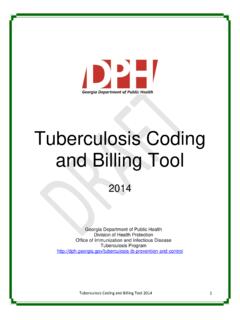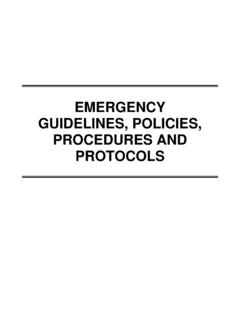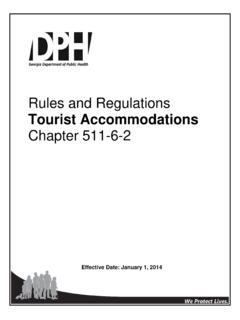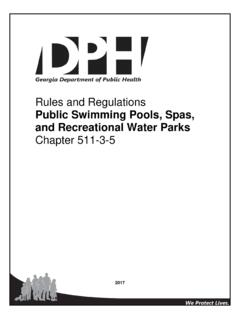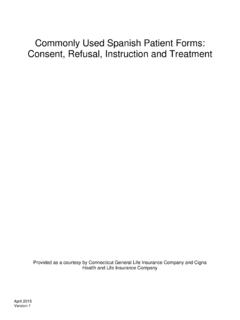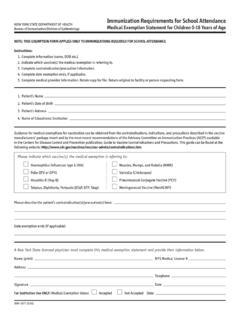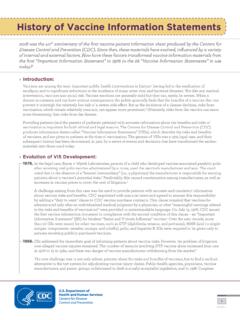Transcription of Meningococcal Conjugate Vaccines (MCV4)
1 PERSONS WITH CERTAIN MEDICAL OR OTHER RISK CONDITIONS Children aged 9-23 months: Persistent complement component deficiency: 2-dose primary series (0, 3 mo) & 1st booster dose in 3 years, then every 5 years Travel or current outbreak: 2-dose primary series (0, 3 mo; may use 0, 2 mo for travel); if continued risk, 1st booster dose 3 years later Persons aged 2-55 years with persistent terminal complement deficiency or asplenia (functional or anatomic): Aged 2-6 years: 2-dose primary series (0, 2 mo) & 1st booster dose in 3 years then a booster dose every 5 years thereafter Aged 7-55 years: 2-dose primary series (0, 2 mo) & a booster dose every 5 years thereafter Persons aged 2-55 years who are at increased risk due to prolonged exposure ( , travel to/living in endemic areas, current outbreak, microbiologists exposed to N.)
2 Meningitidis) or when required ( , military recruits, travel to Mecca during annual Hajj): Give 1 dose; if the person remains at increased risk, a booster dose is recommended (based on age): 3 years later for children vaccinated at aged 2 through 6 years 5 years later for persons vaccinated at age 7 years or older Persons aged 2-55 years with HIV & an indication for vaccination should receive a 2-dose primary series (0, 2 mo) Need and interval for booster dose determined by risk factor HIV without another risk factor present, is not a medical indication for Meningococcal vaccination Ensure students age 21 years or younger who are entering college/living in dorm have received a dose of MCV4 in the last 5 years Consider 1 dose of MCV4 for students age 21 years or younger who are currently attending college, with no dose in the last 5 years MCV4 is not routinely recommended for healthy persons age 22 years or older CONTRAINDICATIONS An anaphylactic (severe allergic)
3 Reaction to a prior dose or a component of MCV4 vaccine PRECAUTIONS Moderate to severe acute illness FURTHER POINTS Persons indicated for a 2-dose primary series who previously received only a 1st dose of MCV4, should get a 2nd dose of MCV4 as soon as feasible; forecast the booster dose (if applicable) from the date of the 2nd primary series dose MPSV4 ( Meningococcal Polysaccharide vaccine ), while approved for persons age 2 years & older, should only be used for persons age 56 years & older or when a contraindication to MCV4 (but not MPSV4) exists Persons who inadvertently receive MPSV4 should be revaccinated with MCV4 using a minimum interval of 8 weeks Both MCV4 Vaccines contain serotypes A, C, Y, and W-135. Serotype B is not in either vaccine . Meningococcal vaccine Information Statement (VIS), can be found at Use the lot number on the outside box of MENVEO to document in GRITS and on the VAR 1 PCV is pneumococcal Conjugate vaccine .
4 Ensure at least one supplemental dose of PCV13 (Prevnar13 ) is given to children with asplenia 2 MCV4/MENVEO may be given to children age 2 years and older with PCV or at any interval before/after PCV Resources: Updated Recommendations for Use of MCV4, ACIP 2010, MMWR 01/28/11 and other Meningococcal vaccine Updates, including the Use of MCV4 for children aged 9-23 months are located at Adapted from the Michigan Department of Community Health January 2012 vaccine Administration Intramuscular (IM) injection in the deltoid of the arm - inch, 22-25 gauge needle Use professional judgment in selecting needle length Give simultaneously with all Vaccines except: For children aged 2 years & older with asplenia, if using Menactra give PCV1 series 1st & Menactra2 4 weeks later Storage and Handling Store in the refrigerator between 35 -46 F (2 -8 C); Do NOT freeze Keep in the original box Menactra is ready to use; shake well MENVEO must be reconstituted - Draw up MenCYW liquid (diluent) -Add to Men A vial; invert; shake well MCV4 Menactra MENVEO Meningococcal Conjugate Vaccines (MCV4) Age Indications for MCV4 Vaccines Menactra (sanofi pasteur): for aged 9 months through 55 years MENVEO (Novartis): for aged 2 through 55 years Indications for Use and Schedule Routinely administer: - One dose at aged 11-12 years.
5 Booster dose at age 16 years Adolescent catch-up schedule: - If 1st dose given at aged 13 through 15 years, give a booster dose at aged 16 through 18 years - If 1st dose given at age 16 years or older, a booster dose is not recommended Recommended for persons aged 9 months through 55 years at high risk for disease (see below) Minimum interval - 8 weeks between 2 doses for all ages
